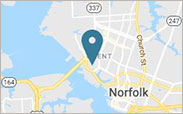Rotations
Rotations are scheduled to meet ACGME requirements and support the professional development of the psychiatric resident.
First year
Emphasis is placed on assessment, development of comprehensive differential diagnoses, biopsychosocial formulation, and development of a treatment plan. Participation in treatment teams allows the resident to develop collegial and leadership skills. Training sites, Sentara Norfolk General Hospital (SNGH) and the Hampton Veterans Affairs Medical Center (VAMC)
- Inpatient Psychiatry: 6 months
- Internal Medicine: 4 months
- Neurology: 2 months
Second year
Emphasis is placed on an immersive experience in assessment of psychiatric patients outside of the inpatient unit. The child psychiatry rotation provides experiences in inpatient, consult, and outpatient psychiatry. Residents learn the importance of family integration through exposure to Parent Child Interaction Training. Training sites, Sentara Norfolk General Hospital (SNGH), Hampton Veterans Affairs Medical Center (VAMC), and Children’s Hospital of the King’s Daughters (CHKD)
- Inpatient Psychiatry: 3 months
- Consult and Liaison: 3 months
- Emergency Psychiatry: 3 months
- Child Psychiatry: 2 months
- Addiction Medicine: 1 month
- Night Float: 1.5 months
- Day Float: 1 month
Third year
Emphasis is placed on longitudinal care of outpatients provides the psychiatry resident the opportunity to learn how patients manage psychiatric illness in their world. Training sites, Virginia Beach Department of Health Services (VBDHS), Norfolk Community Service Board (NCSB), Hampton Veterans Affairs Medical Center (VAMC), Community Based Outpatient Clinic (CBOC), and Children’s Hospital of the King’s Daughters (CHKD)
- Outpatient Services: 12 months
- Night Float: 1 month
Fourth year
This experience serves as an element of the residents developing progressive responsibility for academic and patient care activities while teaching more junior residents and receiving supervision on team management. Training sites, inpatient units at Sentara Norfolk General Hospital (SNGH) and Hampton Veterans Affairs Medical Center(VAMC) where the resident essentially is responsible for the care of the patients on an inpatient service.
Diverse elective options are present as well, including rotations in
- Sleep Medicine,
- Transcranial Magnetic Stimulation (TMS)
- Pain Management Clinic
- Program of Assertive Community Treatment (PACT) Team,
- electroconvulsive therapy,
- Posttraumatic Stress Disorder Clinical Team
- Mental Health Intensive Case Management Program
- research
- Telepsychiatry
- Another option is to add an advanced rotation in child or consult psychiatry, or neurology.
- Junior Attending
- Day Float
